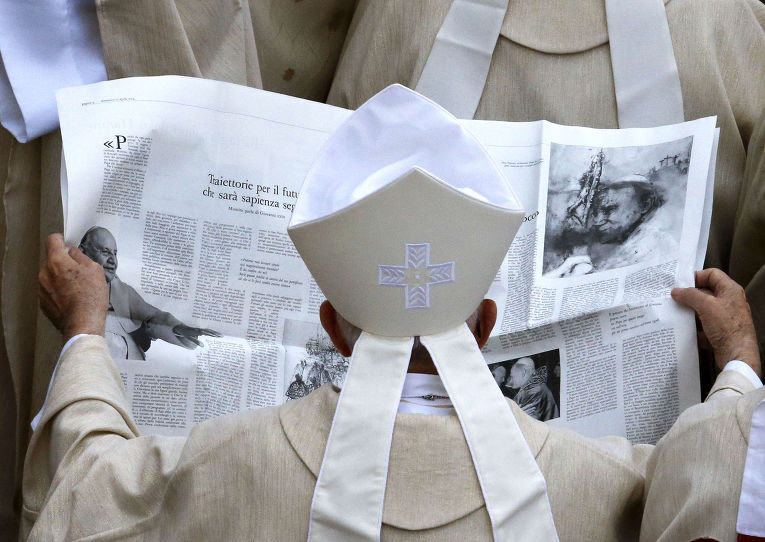Газета "Наш Мир" Every night, when Yang prays with her seven-year-old daughter, she
knows that she is doing something illegal. Like millions of other
Chinese Christians, Yang refuses to be a member of one of the official
state-sanctioned churches. Instead, she gathers twice a week with two
dozen other Protestants in a private living room to pray and sing - far
away from the gaze of the Communist Party.
She says she is not opposed to the Chinese government at all, but
just wants the freedom of religion that is guaranteed in the Chinese
constitution. And she wants her daughter to grow up as a Christian. In
China's state-sanctioned churches it is prohibited to share faith with
anyone younger than 18.
"Our life has become so hectic, there is so much pressure. When my
husband left me, I was devastated. But one of my friends took me to one
of their gatherings and I realised that someone loves me. I want my
daughter to grow up knowing that there is more in life than just money. I
want her to care more about other people," Yang says. Officially atheist, Communist China is witnessing a massive rise in
religiosity. Recent surveys have found that one in every three Chinese
consider themselves to be religious.
 "All Chinese religions have
been growing, especially popular or 'folk religion'," explains Daniel
Bays, a professor of history and the director of the Asian Studies
programme at Calvin College in Michigan. "All Chinese religions have
been growing, especially popular or 'folk religion'," explains Daniel
Bays, a professor of history and the director of the Asian Studies
programme at Calvin College in Michigan.
"Protestant Christianity
seems to be growing fastest, because it is congregational, providing a
social-belonging aspect, leaders can be self-proclaimed, not needing
formal credentials."
Historically, China's policies on religion have veered between approval, bloody repression and grudging tolerance.
After the establishment of the People's Republic of China (PRC) in
1949, the new regime was largely tolerant of religion, believing it to
be a backward vestige of the country's imperial past and thus doomed to
extinction. But, like other religions, Christianity suffered during the
mass nationalism and atheism of the Cultural Revolution (1966-1976).
Under the leadership of Mao Zedong, it was viewed as a foreign doctrine
that served the interests of capitalist imperialism - an ideology that
led to decades of bloody persecution.
A 'thirst for spirituality'
But economic reforms, changing attitudes towards Communism and the
liberalisation of religious policies during the 1980s have led to a
dramatic growth in Christianity.
According to China Aid, a
US-based human rights group, the number of Christians in China has
increased 100-fold since the PRC was founded. Current estimates range
from 80 million to 130 million active Christians, including members of
so-called house churches. In a country of 1.3 billion that figure may
not seem too high, but its significance becomes more apparent when
compared to the 78 million Chinese that China Daily reports were members of the Communist Party as of June 2010.
"The Cultural Revolution disillusioned Chinese people and the
brainwashing atheist education made people thirsty [for] spirituality,"
says Mark Shan, the spokesperson for China Aid.
Over the past 30 years, Christianity has gradually adapted to local
realities and is no longer seen as a faith imported from the West. And
while in the West, Christianity may be widely associated with tradition,
in China it is increasingly identified with modernity, business and
science.
"We should view Christianity as a Chinese religion, not a Western one
any longer," says Bays. "There is very little left of viewing
Christianity as the religion of the West as it was in the 1950s."
Some experts believe that China could soon be home to the largest
Christian population in the world. And the Chinese government has been
surprisingly open towards Protestantism - funding the construction of
churches and providing seminaries for the training of new church leaders
- at least until recently.
But, Carsten Vala, an assistant professor and expert on Chinese
Christianity at Loyola University Maryland, believes the Chinese
government's position may have been more tactical and pragmatic than
reflective of a genuine step towards religious freedom.
"It's good public relations to build churches. Overseas, they get
good press, such as when they built the first church in Beijing in more
than 50 years for the Olympics in 2008. It immediately was overflowing
with Protestants," Vala says.
"But Beijing had more than 60 churches prior to 1949; in the early 1980s that number had dwindled to less than 10."
 China's 'lost soul'Some believe that Christianity could help fill a moral void in an
increasingly self-centred, materialistic and corrupt society, as well as
helping to meet the demand for social services. China's 'lost soul'Some believe that Christianity could help fill a moral void in an
increasingly self-centred, materialistic and corrupt society, as well as
helping to meet the demand for social services.
"Immorality,
especially sexual immorality, greed and corruption are soaring in
China," says William Jeynes, a professor of education at California
State University and a non-resident scholar at Baylor University. "The
government acknowledges this. One Chinese government leader was even
quoted as saying 'China has lost its soul.' Immorality in China is out
of control and many in the government believe that Christianity might be
the nation's best hope to establish morality."
Jeynes suggests the Chinese government may be adhering to the
perspective of German sociologist and political economist Max Weber who
believed that a strong work ethic, love for one's neighbour,
self-discipline and trust often accompanies Protestantism and can be
essential to keeping a nation's economic machine in working order.
China's
government must ensure that the country's economy keeps booming to feed
its 1.3 billion people in order to prevent social and political unrest.
And it may just see Christianity as beneficial to the maintenance of
social stability and economic growth.
"They believe that Christianity is responsible for much of the historic success of Western Europe and the US," says Jeynes.
"Similarly,
many Chinese believers see the current economic decline of the US and
Europe, as a direct result of the decline of serious adherence to the
Christian faith in these countries. The Chinese believe that as a result
what arose was greed on Wall Street, government corruption, and greed
among many people causing them to buy homes that they could not afford.
China hopes that by embracing Christianity and learning from both the
past success and the present failures of the US and Europe, it will be
able to prosper rather than fall as a result of immorality produced by
secularism."
But, Jeynes stresses, the attitude of Chinese
leaders towards the growing number of Christians can be best described
as a "confluence of seemingly contradictory attitudes".
Means of control
While embracing Christianity for its supposed economic and social
benefits, the Communist Party still wants to assert control over the
country's Christians - dictating where they worship and what is preached
there.
"By building churches and requiring Protestants to worship inside
registered churches, they can exert some control over the training and
appointment of church staff, where churches are established, how many
services are held, and in some cases even try to pressure church pastors
in the content of their preaching," Vala says.
In 1978 and 1979, party and state leaders re-established an apparatus
for monitoring religion and implementing religious policy that had
originally existed in the 1950s. All Protestants whose churches were
reopened after the Cultural Revolution were expected to register their
congregations with the government.
But many Chinese are members of unregistered churches, small
congregations who meet privately, usually in apartments and houses. Some
say that the registered churches do not include all sects of
Christianity, particularly in rural areas where there may not be enough
registered churches to meet believers' needs.
"Among these unregistered groups, some consciously avoid association
with the three-self [official church] structure because of memories of
radical politics and persecution in the church in the 1950s. Some refuse
to register out of theological principle. And some have strong leaders
who do not want to be in a system where they would be accountable to
anyone, especially not to a government or party body," says Bays.
As long as they avoid confrontation and keep their
congregations small - 25 is the maximum gathering allowed by law without
official permission - the Protestant house churches are mostly
tolerated by the government. Catholic ones are kept under closer
scrutiny because of China's tense relationship with the Vatican over its
continued diplomatic recognition of the government of Taiwan
and disagreement over who has the final say on the consecration of
Chinese bishops.
By keeping house churches small, the Communist Party may be
attempting to ensure that no church becomes large enough to threaten the
power of the local party chief. But, paradoxically, this policy also
helps to ensure the spread of Christianity, for as congregations grow
they are forced to split up and create new branches.
"The state fears religion, the more organised the more it fears it,"
says Bays. "There have been several successful religion-led rebellions
in Chinese history. You could say the state and party are paranoid;
after failure to eliminate religion at times of extreme Maoist
radicalism, the recent leaders have resigned themselves to religion
remaining a social feature for a long time. So they try to control it
through bureaucratic means."
Chinese authorities fear that
massive oppression could lead to organised resistance, while too much
freedom could also impact their leadership. It is conscious of the fact
that the church played an important role in the events that led to the
fall of the Berlin Wall and in advancing democracy in Eastern Europe.
"They want to learn from the lessons of the former Soviet Union in
this regard. The effort to overthrow Communism was largely a
Christian-based effort," Jeynes says. "China's government leaders are
also well aware that it is estimated that Christians constituted about
30 per cent of those who protested in the Tiananmen Square uprising of
1989. Therefore, these facts have caused China's leaders to be concerned
about Christianity and persecute Christians."
Jeynes says that the 'Arab Spring' coupled with the Nobel Prize being
awarded to Liu Xiaobo, a major critic of the Chinese government,
in December 2010 has also caused China to become more cautious about
Christianity.
"With the spawning of these events government crackdowns against
Christians and other people of faith have increased substantially. The
Chinese are especially nervous because they believe that the 'Arab
Spring' ... could easily make its way into China," Jeynes says. Increasing pressure  The result has been an increase in the amount of pressure exerted on members of unregistered churches and unofficial groups. The result has been an increase in the amount of pressure exerted on members of unregistered churches and unofficial groups.
One of them is Shouwang Church, Beijing's biggest house church with
more than 1,000 members. Shouwang means "to keep watch" in Chinese,
and its members refuse to let themselves be absorbed into the official
churches.
Over the past 12 weeks, Shouwang has become a major
annoyance for Beijing's authorities because it insists on trying to hold
outdoor services.
According to China Aid, 15 church members were detained for showing
up at Shouwang's designated outdoor worship site on Sunday, June 26.
Some Shouwang members claimed they were detained in hotels to prevent
them from going to the site and several Shouwang leaders are under house
arrest.
But despite repression, house churches seem to be retaining their
popularity among the Chinese. Vala believes that the main reason for
this is that there are too few registered churches and that those that
do exist may be too formal for some.
"Unregistered churches offer
frequent services every week, including prayer, Bible study, and
worship services. They also offer an intimacy among members who meet
often and get to know each other much better than when hundreds gather
in large registered churches," says Vala, adding: "There is also a
population that attends both registered church services on Sundays and
then attends unregistered churches for Bible studies, too."
China Aid's Mark Shan stresses that many Chinese Christians actively
choose to join house churches because of the freedom of speech they
allow.
"It is safer for those social professions who are
forbidden to be religious: such as government-paid jobs, students,
teachers, anyone under 18 years old. Three-self [official] churches have
many spies to watch people, and their sermons have limited freedom. For
example you cannot mention anything about social injustice, political
corruption, and mass abortions driven by Chinese birth-control policy
brutally enforced in the last 30 years, even from a perspective of
Christian ethics," says Shan.
Huang Jianbo, an anthropologist at Beijing's Renmin University, says
migrant workers in particular seem to be attracted to Christianity and
often join house churches.
"Migrant workers are regularly victims of discrimination. Despite the
fact that China's cities are being built by them, they are just
treated as second-class citizens," he says, adding that most migrant
workers tend to prefer house churches because they often feel unwelcome
in urban church communities.
"Churches in China generally have no interest [in] involving
[themselves] in social changes or revolutions because they focus on
spiritual matters .... However, such a spiritual ... focus will
accelerate a cultural or even a social change unconsciously and
naturally," says Shan.
"Yet if persecution [by] the government
[does] not leave room for churches to survive, churches may become more
like a catalyst [for] social change through exercising non-violent civil
disobedience, as [the] Beijing Shouwang Church [has] in the past 12
weeks."
| 













